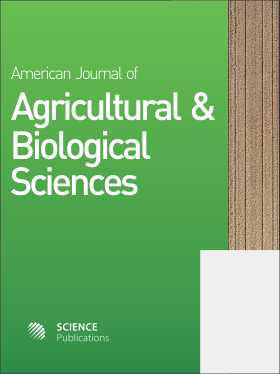Farmers' Use of Integrated Soil Fertility and Nutrient Management Practices for Sustainable Crop Production: A Field-level Study in Bangladesh
- 1 Graduate School of Bioagricultural Sciences, Nagoya University, Furo-Cho, Chikusa-ku, Nagoya-shi, Nagoya 464-8601, Japan
Abstract
Problem statement: The most pressing problem for Bangladesh agriculture is the current state of gradual decreasing of soil fertility, stagnating crop yields and declining productivity in a range of food crops. According to crop production scientists, Integrated Soil Fertility (ISF) and Nutrient Management (NM) is an advanced approach that can serve as a remedy to improve crop yields and to preserve soil fertility in the long run. Approach: This study was therefore conducted to determine the extent of use ISF and NM practices by the farmers for their crop production in Bangladesh. Data were collected from 120 farmers (39 landless, 34 marginal, 19 small, 20 medium and 8 large farmers) from eight villages located in four districts in Bangladesh through face-to-face interviews from December 2005 to January 2006. Results: Most of the farmers were landless, marginal or small farm holders who rarely practiced soil fertility management means. Medium and large farmers did practice soil fertility management either occasionally or regularly. The use of organic manures by different categories of farmers indicated that medium and large farm holders were more careful about the use of cow dung, farmyard manure, crop residues, green manure and oil cakes as sources of organic manures than landless, marginal and small farm holders. Findings related to use of chemical fertilizers revealed that medium and large farmers often followed the recommended doses while landless, marginal and small farmers mostly applied chemical fertilizers based on their own assessment of soil conditions. Conclusion/Recommendations: Medium and large farmers are more prompt than landless, marginal and small farmers in terms of use of different components of ISF and NM practices for their crop production. The findings of this study might be helpful for the agricultural policy planners both from GOs and NGOs for developing effective crop production strategies considering soil fertility and plant nutrients aspects for landless, marginal and small farmers who constitutes about 74%of farming community in Bangladesh.
DOI: https://doi.org/10.3844/ajabssp.2008.716.723

- 6,225 Views
- 5,900 Downloads
- 3 Citations
Download
Keywords
- Use
- management
- integrated soil fertility
- plant nutrient
- sustainable crop production
- farmers
